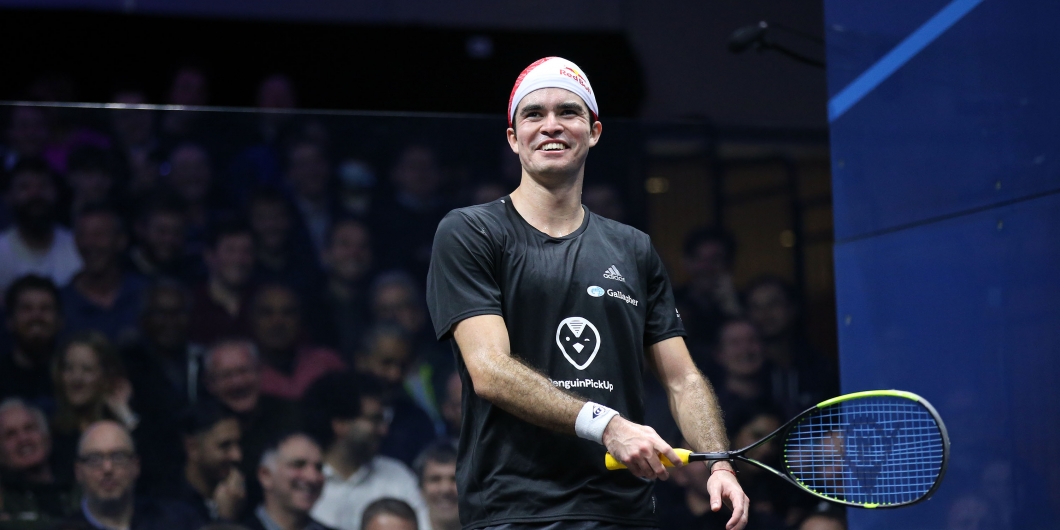Jonathon Power has put the PSA World Championships at the top of his trophy wish list for Diego Elias.
The Canadian, who was crowned World Champion in 1998 when he beat Peter Nicol over four rollercoaster games in Doha, was buoyed by Elias’ victory over the game’s soon to be new World No.1, Paul Coll, in the semi-final of the Motor City Open last month.
Elias also defeated Coll in the final of the Qatar QTerminals Classic in October to secure his first PSA Platinum title and although Coll beat his good friend in the semi-final of the Canary Wharf Classic a month later, it was Elias who prevailed in Detroit last time out, with the match hinging on a fourth game tie-break.
All of which had the watching Power planning ahead to Elias’ assault on the game’s defining titles; the Allam British Open which is scheduled for the end of March and ultimately the PSA World Championships which are slated for Cairo in May.
With Elias still just 25, Power has absolutely no doubt that time is on his man’s side and that the Peruvian’s best years are still well ahead of him.
“I think Diego is going to win most tournaments this year and I would include another major in that. I think you go into every single match with the same preparation although obviously the World Championships has a little bit more pressure as you get the title with it,” the former World No.1 said.
“That means something outside the sport, something you can monetise outside of squash whereas I don’t think you will make any extra money by winning the British Open but your sense of pride as a squash player, yes for sure there is an extra take away there.
“But the World Championships is the only thing that will change your life monetarily and marketing wise, so that is the only major that makes a difference in your life and the rest are all the same.
“So, it’s just beating the best players in the world every tournament and you will do it some weeks and not others but I think Diego’s baseline game has gone to a place where it is going to be very hard for anyone to worry him before the semi-finals.
“Then it is going to be two matches to see if he can get the tournament each time.”
Having moved inside the world’s top five in November following his maiden Platinum win in Qatar, Elias now sits at World No.6, but Power says it makes no difference to his charge where he is bracketed.
Elias with the Qatar QTerminals Classic trophy
“It would be a help in terms of the draw for somebody but not for Diego because he is going to win the tournament in his mind but you got to beat everybody in any case,” said the Canadian.
“It may be a help for someone else who is trying to hold on to a ranking but might get a bad draw like getting Diego in the quarter-finals.
“But Diego wasn’t even dented after the Motor City Open, he was training back on Monday. He played [Karim Abdel] Gawad, Paul [Coll] and [Fares] Dessouky and he woke up the next day not even feeling it, he is so strong and fit now so I don’t worry about his body the way I did when he was developing it.
“He is such a tall, big, bodied guy and that wasn’t put together with strength and muscle but just pure squash and now that he has the muscle and the strength and the ability to recover these things don’t matter but he is also getting guys off the court quicker which is a plus.
“So the physical challenges are not as much of a worry as they were before. Diego is going to be tough to beat for a very long time and it will be challenging for people to breakthrough that level of squash he is now playing at and producing.
“Length, strength, ball control and options plus different choices and now that the movement is there he has so much more to offer.
“I would also say that Diego is just 25 right now and that he won’t be playing his best squash until he is somewhere in that bracket of say 28-32, so now he has a fully formed body and 10 years to capitalise on it.”
Yet despite his clear confidence in what the future holds for his pupil, Power admits that Elias is still very much a work in progress.
“We developed a new swing the morning of the day Diego played Paul [Motor City Open semi-final], added a whole new swing, and put it into practise during the game, so we are changing things all the time and adding little nuances,” he explained.
“The swing was mostly backhand but a little bit of both wings, however Diego’s backhand has improved tremendously and that is the area I am most happy with in Diego’s development.
Elias in action
“I’m planning to head down to Boca Raton this week to see him and the team is in place but it is nice when we can get on court and enjoy a little bit of practicality around the tournaments. For me that’s where I can add a lot of value in terms of being there, understanding the emotions Diego is going through and I would prefer to really make the difference there.
“But we know what we need to work on and there are a couple of things in that respect but you also always forget things and need to be reminded of them. It can be a case of: ‘Yeah, yeah, yeah I need to be doing that again.’
“Also the touch points that are important on the lead up to a tournament are similar in that they need to be reinforced but now Diego is so sound and he has increased his level of movement by 10% from when I saw him last at Canary Wharf and I believe he has gone up at least a level if not a level and a half.”
Not surprisingly, the former British Open champion has an interesting take on how the second-half of the season will pan out.
“The dominance and where Diego has gotten to and his ability to now put what he has been practising into a real-world game, his strength on the ball and his different swings all of that was positive at Motor City,” Power said.
“But also it was on a back court, a traditional court, which is a true test of physicality and ball control and commanding the middle of the court and wearing the guy down and giving him no place to play. So it was suffocating for a lot of guys against Diego.
“I think there is now a little bit of a gap with Paul and Diego, these two with Ali [Farag], not much but a slight level over the next group and those three are going to be fighting for wins. To play Paul on the type of court he is so comfortable on in Detroit and everything comes back and there are no winners and no real penetration on the length and to dominate him like that was really encouraging.
“As we get back on to more favourable courts for Diego that will only have added to his confidence going forward. But I think if you talked to 100 squash players then they would have backed Paul to beat Diego on a back court, you might get more penetration but the ball comes off the back and Paul can always get his racket under it, so you get penetration in terms of the ball coming off the back wall but what does that do against Paul? Nothing!
“You have got to find the length that kills, so every court is different and every one is suited to a different style. But I must give Paul credit, he was incredible the way he ran was unbelievable, he ran two or three times the amount Diego ran and yet Diego was the one that got tired!
“So, Paul’s level of movement and fitness was pretty impressive as was his ball control and the way he kept it out of the middle channels. Diego had to really earn every one of his points.”
Credit: RJ Mitchell

